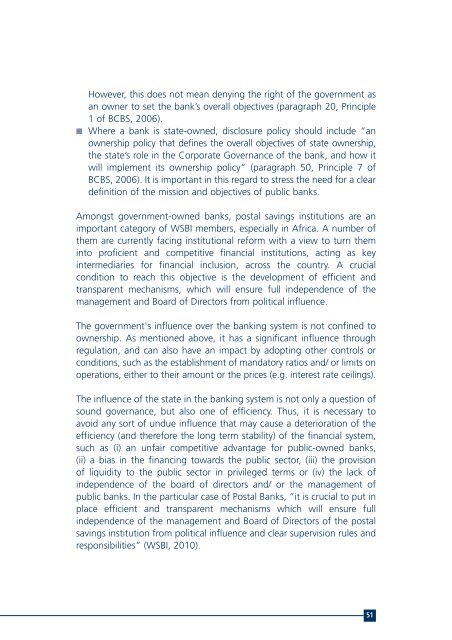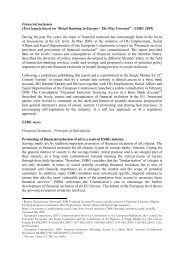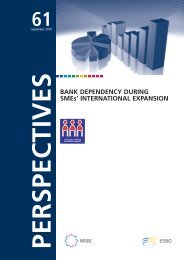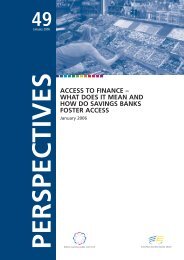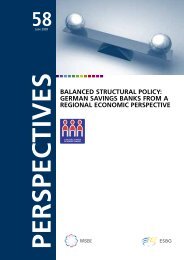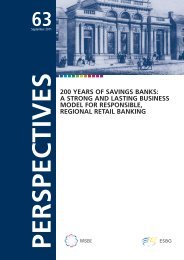Corporate Governance and Access to Finance - ESBG
Corporate Governance and Access to Finance - ESBG
Corporate Governance and Access to Finance - ESBG
You also want an ePaper? Increase the reach of your titles
YUMPU automatically turns print PDFs into web optimized ePapers that Google loves.
nHowever, this does not mean denying the right of the government asan owner <strong>to</strong> set the bank’s overall objectives (paragraph 20, Principle1 of BCBS, 2006).Where a bank is state-owned, disclosure policy should include “anownership policy that defines the overall objectives of state ownership,the state’s role in the <strong>Corporate</strong> <strong>Governance</strong> of the bank, <strong>and</strong> how itwill implement its ownership policy” (paragraph 50, Principle 7 ofBCBS, 2006). It is important in this regard <strong>to</strong> stress the need for a cleardefinition of the mission <strong>and</strong> objectives of public banks.Amongst government-owned banks, postal savings institutions are animportant category of WSBI members, especially in Africa. A number ofthem are currently facing institutional reform with a view <strong>to</strong> turn themin<strong>to</strong> proficient <strong>and</strong> competitive financial institutions, acting as keyintermediaries for financial inclusion, across the country. A crucialcondition <strong>to</strong> reach this objective is the development of efficient <strong>and</strong>transparent mechanisms, which will ensure full independence of themanagement <strong>and</strong> Board of Direc<strong>to</strong>rs from political influence.The government's influence over the banking system is not confined <strong>to</strong>ownership. As mentioned above, it has a significant influence throughregulation, <strong>and</strong> can also have an impact by adopting other controls orconditions, such as the establishment of m<strong>and</strong>a<strong>to</strong>ry ratios <strong>and</strong>/ or limits onoperations, either <strong>to</strong> their amount or the prices (e.g. interest rate ceilings).The influence of the state in the banking system is not only a question ofsound governance, but also one of efficiency. Thus, it is necessary <strong>to</strong>avoid any sort of undue influence that may cause a deterioration of theefficiency (<strong>and</strong> therefore the long term stability) of the financial system,such as (i) an unfair competitive advantage for public-owned banks,(ii) a bias in the financing <strong>to</strong>wards the public sec<strong>to</strong>r, (iii) the provisionof liquidity <strong>to</strong> the public sec<strong>to</strong>r in privileged terms or (iv) the lack ofindependence of the board of direc<strong>to</strong>rs <strong>and</strong>/ or the management ofpublic banks. In the particular case of Postal Banks, “it is crucial <strong>to</strong> put inplace efficient <strong>and</strong> transparent mechanisms which will ensure fullindependence of the management <strong>and</strong> Board of Direc<strong>to</strong>rs of the postalsavings institution from political influence <strong>and</strong> clear supervision rules <strong>and</strong>responsibilities” (WSBI, 2010).51


